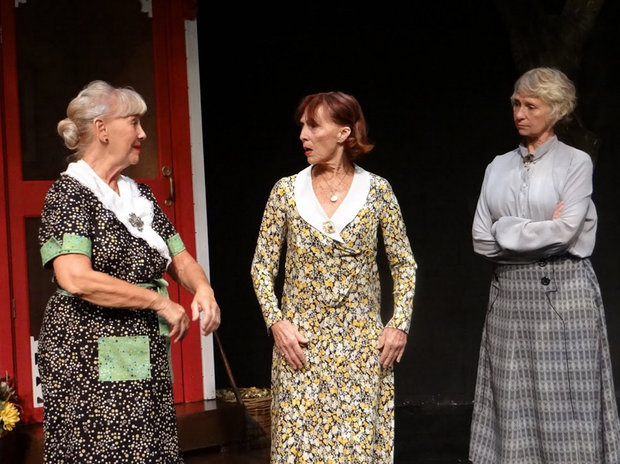
Set in an American town in 1938, Morning’s at Seven, Paul Osborn’s nostalgic story of four mature sisters at a turning point in their lives, seems to strike audiences as either classic or creaky. Strong performances make a big difference to the play’s reception, and director Pam Wiley has elicited a number of them.
The inciting incident for rousing the sisters’ highs and lows in their relationships is that middle-aged nephew Homer (Ken Basque, nicely nervous) is bringing to meet his family the fiance he’s courted for 15 years. So proper, usually condescending Myrtle (meant-for-the-part Kristi Hibschman), obviously wants closure re the engagement. Homer’s mother Ida (Connie Farris, a sterotypical typical housewife), when husband Carl (Alex J. Topp, suffering more than sufficiently) bolts, suddenly worries that she could be alone. Carl disappears with a typical sick spell at the thought of seeing his nephew launching a new life while he didn’t fulfill his ideal of being a dentist. Sister Cora (Carol Nelson, sensible) also contemplates the end of a dream -- to live her last days with husband Theodore (shown as spineless by Joseph Allen Smith) in a house Carl had built for his son to have when he marries. It’s empty, unlike Cora and Theodore’s, since they took in Arry, the attractive sister (Sami Blouin) with a secret (that’s easy to figure out) as the youngest when the parents died.
To find Carl and meet Myrtle, the oldest, most sensible sister Esther (Erica Drezek, perfect) defies her retired professor husband (Roy McChesney, crusty), who calls the whole family morons and forbids her to see them. He’s a typical psychological spouse abuser. In fact, there are nothing but stupid, spineless men in the play, making the underlying resentments all the sisters hold toward each other seem easier for their virtues to conquer.
The scenery consists mainly of the married sisters’ two white cottages with different colored trim but wonderfully equal, across from each other. There’s a large tree in the central background. A jarring note: tree stumps are set down center for dyadic conversations at times. Because Theodore starts with a narrative there, one expects a presentational play, but it quickly turns realistic. And at times, whoever sits there has to talk over a shoulder to someone on a house step, or the persons seated are unlikely to be in such a place at all. It’s the director’s faulty choice.
Costumes couldn’t be better. They fit the characters and the era, in which people actually dressed with some care even at home. The script itself seems as if written for a TV sitcom pilot. I guess it would take place just before or after the wedding of Homer and Myrtle. And then the audience would find out what references to a baby were about.
